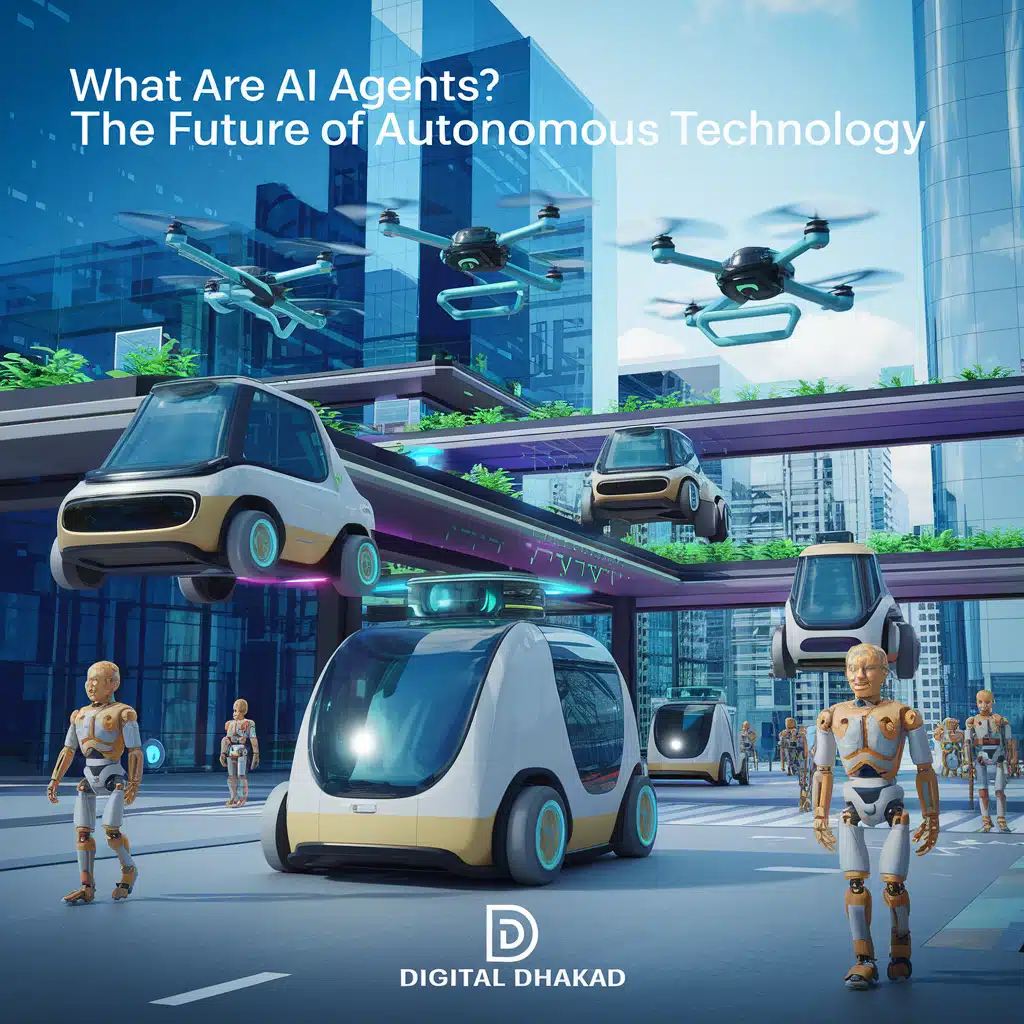
In an era where artificial intelligence (AI) is no longer science fiction but a daily reality, AI agents are emerging as the unsung heroes of automation. From managing your calendar to piloting self-driving cars, these intelligent systems are quietly reshaping how we live, work, and interact with technology. But what exactly are AI agents, and why are they being hailed as the cornerstone of the next technological revolution? Let’s dive in and explore the world of AI agents.
What Are AI Agents?
At their core, AI agents are software programs or systems designed to perform tasks autonomously by perceiving their environment, processing information, and taking actions to achieve specific goals. Unlike traditional algorithms that follow rigid instructions, AI agents use machine learning (ML), natural language processing (NLP), and other advanced technologies to learn, adapt, and make decisions in real time.
Think of them as “digital employees” that can:
- Perceive: Gather data from sensors, cameras, text inputs, or other sources.
- Reason: Analyze data, predict outcomes, and optimize decisions.
- Act: Execute tasks like sending alerts, controlling devices, or generating responses.
Examples range from simple chatbots like Siri to complex systems like autonomous delivery drones or AI-powered financial trading bots.
Artificial Intelligence (AI) has transformed the way we interact with technology. From virtual assistants like Siri to self-driving cars, the power of AI is everywhere. But have you ever wondered what drives these intelligent systems? Enter AI agents, the brains behind the operation, enhancing our daily interactions and experiences.
Types of AI Agents
- Reactive Agents: Respond to current inputs without memory (e.g., chess-playing AI like Deep Blue).
- Deliberative Agents: Use internal models to plan actions (e.g., self-driving cars).
- Utility-Based Agents: Maximize “happiness” metrics (e.g., Netflix’s recommendation engine).
- Learning Agents: Improve over time via feedback (e.g., spam filters in Gmail).
How AI Agents Work
AI agents are essentially computer programs that perform tasks intelligently. They rely on algorithms, which are step-by-step instructions, to analyze data, make decisions, and complete tasks.
Key Components of AI Agents:
- Sensors – These collect data from the environment.
- Effectors – These are used to perform actions in the environment.
- Decision-Making Mechanisms – Algorithms and models that process data and determine actions.
How Do AI Agents Work? A Deep Dive
Let’s break down their operation with real-world analogies:
1. Sensing: The “Eyes and Ears” of AI
- Example: Autonomous drones like Skydio use 360° cameras and LiDAR to map surroundings in real time.
- Data: A single Tesla car generates ~1.3 terabytes of data per day from its sensors.
2. Processing: The “Brain” Behind Decisions
- Case Study: AlphaFold by DeepMind revolutionized biology by predicting protein structures. It processed 200 million proteins in 18 months—a task that would take humans centuries.
- How It Works: Neural networks mimic the human brain, identifying patterns (e.g., detecting tumors in X-rays with 95% accuracy vs. 88% for human radiologists).
3. Acting: From Analysis to Execution
- Real Scenario: In 2021, Uber Eats deployed AI agents to optimize delivery routes, reducing delivery times by 15% and saving $50M annually.
- Industrial Use: Boston Dynamics’ Spot robot inspects oil rigs, navigating hazardous environments without human intervention.
4. Learning: The Feedback Loop
- Reinforcement Learning: OpenAI’s Dota 2 Bot taught itself to beat world champions by playing 45,000 years’ worth of games in 10 months.
The Evolution of AI Agents
From Rules to Reasoning:
- 1997: IBM’s Deep Blue beat chess champion Garry Kasparov using brute-force calculations.
- 2011: Apple’s Siri introduced voice-based assistants but struggled with context.
- 2023: GPT-4 writes code, debates philosophy, and even mimics human creativity.
Generational Leap:
- 1st Gen: Scripted chatbots (e.g., airline booking systems).
- 2nd Gen: Context-aware assistants (e.g., Google Duplex booking haircuts via phone calls).
- 3rd Gen: AutoGPT, which self-prioritizes tasks like “Plan my vacation” by booking flights, hotels, and creating itineraries autonomously.
AI Agents in Action: Industry-Specific Breakthroughs

1. Healthcare: Saving Lives with Speed and Precision
- Story: In 2020, PathAI partnered with the NIH to diagnose COVID-19 from lung scans. Their AI agent analyzed 100,000+ images in weeks, identifying patterns missed by humans.
- Impact: AI reduces diagnostic errors by 85% in breast cancer screenings (Stanford study).
2. Finance: The Invisible Wall Street Traders
- Real Data: 70% of U.S. stock trades are executed by AI agents (Forbes).
- Case Study: Renaissance Technologies’ Medallion Fund uses AI agents to predict market shifts, generating $10B+ in profit in 2020 alone.
3. Retail: Hyper-Personalized Shopping
- Example: Stitch Fix uses AI agents to curate clothing boxes. Their algorithms analyze 100+ data points per customer (style preferences, weather, social trends), boosting retention by 25%.
4. Manufacturing: The Rise of the Machines
- Siemens’ Use Case: AI agents at their Amberg plant predict equipment failures 3 days in advance, reducing downtime by 30% and saving $15M/year.
5. Agriculture: Farming 2.0
- John Deere’s See & Spray: AI agents distinguish crops from weeds, cutting herbicide use by 90% while doubling yield.
The Future of AI Agents: 5 Trends Shaping Tomorrow
- General-Purpose Agents:
- Project: Google’s Gemini aims to combine language, vision, and action into a single AI agent that can tutor kids, code apps, and manage smart cities.
- Human-AI Symbiosis:
- Copilot Systems: GitHub’s AI agent writes 40% of developers’ code, accelerating software release cycles.
- Edge AI:
- Example: Tesla’s Full Self-Driving (FSD) processes data locally in cars, enabling real-time decisions without cloud dependency.
- Ethical AI Frameworks:
- EU’s AI Act: Bans high-risk applications (e.g., social scoring) and mandates transparency for AI agents in hiring or law enforcement.
- AI in the Metaverse:
- Virtual Agents: Meta’s CAIRaoke creates AI-driven virtual assistants for VR meetings, handling scheduling, note-taking, and follow-ups.
Types of AI Agents
Simple Reflex Agents
These are the most basic type of AI agents. They respond to specific stimuli using predefined rules.
- Example: A thermostat that adjusts temperature based on a set threshold.
Model-Based Reflex Agents
These agents have a better understanding of their environment by maintaining an internal model.
- Example: Robots navigating a maze by considering past movements.
Goal-Based Agents
These agents aim to achieve a specific goal, evaluating different possibilities before deciding.
- Example: GPS systems finding the shortest route to a destination.
Utility-Based Agents
When there are multiple goals, utility-based agents prioritize actions based on the most beneficial outcome.
- Example: Stock market prediction systems balancing profit and risk.
Learning Agents
Learning agents improve their performance over time by adapting to new information.
- Example: Recommendation systems like Netflix that get better with user interaction.
Applications of AI Agents
Personal Assistants
Virtual assistants like Siri, Alexa, and Google Assistant are powered by AI agents. They help with tasks like setting reminders, answering queries, and controlling smart home devices.
Customer Service
AI agents, in the form of chatbots, provide 24/7 customer support, reducing wait times and improving customer satisfaction.
Healthcare
AI agents assist in diagnosing diseases, analyzing medical images, and even suggesting treatment plans.
Finance
From fraud detection to financial forecasting, AI agents are reshaping the finance industry by analyzing vast datasets quickly and accurately.
Benefits of AI Agents
- Efficiency: AI agents can process large volumes of data at speeds unmatched by humans.
- Enhanced Decision-Making: They provide data-driven insights, reducing errors and improving outcomes.
Challenges and Limitations
While AI agents are incredible, they aren’t without challenges:
- Ethical Concerns: Issues like privacy invasion and biased algorithms are significant hurdles.
- Dependency on Data: Poor-quality data can lead to inaccurate results.
The Future of AI Agents
The future of AI agents looks promising. With advancements in machine learning and natural language processing, these systems are becoming more intuitive and capable of handling complex tasks. Imagine a world where AI agents manage your daily schedule, drive your car, and even assist in creative projects!
Challenges: The Dark Side of Autonomy
- Job Displacement:
- Data: McKinsey predicts 30% of tasks in 60% of jobs could be automated by 2030.
- Human Story: A factory worker in Detroit retrained as an AI supervisor after robots replaced his assembly line role.
- Bias and Fairness:
- Amazon’s Hiring Bot Scandal: An AI agent trained on biased resumes downgraded female candidates.
- Security Risks:
- Deepfake Crisis: AI-generated voice scams cost businesses $11B in 2022 (McAfee).

Conclusion: Embracing the AI Agent Revolution
AI agents are revolutionizing industries and making our lives easier. By understanding their types, applications, and limitations, we can better appreciate their role in shaping the future. As technology continues to evolve, AI agents will only become more sophisticated, offering endless possibilities.
AI agents are not just tools—they’re partners in progress. As they grow smarter and more integrated into our lives, their potential to solve global challenges (climate modeling, disease eradication, resource optimization) is limitless. However, their success hinges on responsible development, ethical guidelines, and human-centered design.
The future of autonomous technology is here, and AI agents are leading the charge. Whether you’re a business leader, developer, or everyday user, understanding these systems is key to thriving in the AI-driven world ahead.
AI agents are not just tools—they’re redefining what’s possible. From curing diseases to fighting climate change (e.g., Google’s AI for predicting floods in Bangladesh), their potential is boundless. However, their success hinges on:
- Collaboration: Humans guiding AI, not the other way around.
- Transparency: Demanding explainability in critical decisions (e.g., loan approvals).
- Adaptation: Governments and businesses investing in AI literacy and reskilling.
The future isn’t about humans vs. machines—it’s about humans with machines.
- For Businesses: Pilot AI agents with platforms like Microsoft Azure Cognitive Services or IBM Watson.
- For Individuals: Experiment with AutoGPT or ChatGPT Plugins to automate daily tasks.
FAQs
1. What is the primary purpose of AI agents?
AI agents aim to perform tasks intelligently by analyzing data, making decisions, and executing actions.
2. Can AI agents replace humans entirely?
No, AI agents are designed to assist humans, not replace them. They excel in specific tasks but lack human creativity and empathy.
3. How secure are AI agents?
The security of AI agents depends on their design and implementation. Proper encryption and regular updates can minimize risks.
4. Are AI agents expensive to implement?
While initial costs can be high, the long-term benefits often outweigh the expenses by improving efficiency and productivity.
5. How can businesses benefit from AI agents?
AI agents streamline operations, enhance decision-making, and improve customer experiences, leading to increased profitability.
6. Can AI agents feel emotions?
No—they simulate empathy (e.g., Replika’s therapy bots) but lack consciousness.
7. What’s the difference between AI agents and RPA?
RPA (Robotic Process Automation) follows fixed rules, while AI agents learn and adapt (e.g., UiPath vs. OpenAI).
8. Which industry will AI agents disrupt most?
Healthcare, logistics, and customer service are top contenders.
Final Thought:
As AI pioneer Andrew Ng said, “AI is the new electricity.” Just as electricity transformed industries 100 years ago, AI agents are powering the next wave of global innovation. The question isn’t if you’ll adopt them—it’s how soon.
Which types of AI agents you need for your business, we help contact us here. or what’s App.
